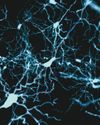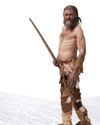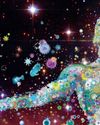Chimpanzees are similar to humans, even when it comes to helping.

Let’s ask the chimps. Chimpanzees are among humans’ closest relatives, and they’ve also been known to help each other. They sometimes hunt together, share food, or groom each other. But what if the favor won’t be returned or—worse yet—there’s an actual cost to helping out? Would a chimp still do it?
THANKS, TAI
Meet Tai. She’s a chimp who lives in the Wolfgang Köhler Primate Research Center in Germany. She was trained to help out other chimps, so researchers could see if those chimps would help her out in return.
In one version of the experiment, Tai didn’t do much of anything. She stood outside a small metal booth. On the opposite side of the booth stood another chimp. For some of the trials, this was a chimp named Kofi. Inside the booth were two choices of food. By pulling on various ropes, Kofi could give himself four pieces of food and give Tai none or give both Tai and himself three pieces of food.
Not surprisingly, Kofi almost always picked the selfish option and took the four pieces of food for himself.
Then researchers had Tai take a chance. She got first choice of the food bowls. But rather than selecting food, she pulled on a rope that opened a latch. This allowed Kofi to decide who got what food instead. Tai was trained to take this action, but Kofi didn’t know that. To him, it looked like Tai had taken a big risk—perhaps not getting any food at all—by letting Kofi pick.
Denne historien er fra May/June 2018-utgaven av Muse Science Magazine for Kids.
Start din 7-dagers gratis prøveperiode på Magzter GOLD for å få tilgang til tusenvis av utvalgte premiumhistorier og 9000+ magasiner og aviser.
Allerede abonnent ? Logg på
Denne historien er fra May/June 2018-utgaven av Muse Science Magazine for Kids.
Start din 7-dagers gratis prøveperiode på Magzter GOLD for å få tilgang til tusenvis av utvalgte premiumhistorier og 9000+ magasiner og aviser.
Allerede abonnent? Logg på

A 12-Year-Old Girl's Election Sticker Is a Winner
VOTING IS A FUNDAMENTAL FREEDOM FOR AMERICANS, A MEANS OF DOING ONE'S CIVIC DUTY AND A WAY AN INDIVIDUAL CAN EXPRESS THEIR VOICE. In 1971, the United States lowered its voting age to 18. But that doesn't mean kids and teens under 18 can't participate in elections in various ways.

If everything the human brain does is basically sets of electrical impulses, how exactly does that translate into a state of mind?
You're not the only one asking this question. Every neuroscientist in the world is wondering the exact same thing, says Zach Mainen

EARTH'S TINIEST BUILDERS
THE HIDDEN WORLD OF MICROBES IN THE EARTH'S CRUST

MUMMIES SPEAK
ABOUT MICROBES, MIGRATION, AND MORE

GOING WITH YOUR GUT
HOW DO MICROBES AFFECT OUR HEALTH? LET'S COUNT THE WAYS...

BUG Detective
A burglar sneaks into a house on a quiet street in New York City. He walks through the house, touching countertops and door handles. Finally, he steals a single card from a full deck. Then he leaves.

Little Creatures Among Us THE MANY MICROBES IN OUR DAILY LIVES
When you think you're alone, you're actually not. In the ground, the air, your room, and even your body are Strillions and trillions of creatures so tiny you can't see them.

A Mars Rock Found With Leopard Spots Could Be a Sign of Ancient Life
IN JULY, NASA'S PERSEVERANCE ROVER CAME ACROSS A SPOTTED ROCK IN WHAT WAS ONCE A RIVERBED IN THE JEZERO CRATER ON MARS.

Para Athlete Uses Exoskeleton Suit to Carry the Olympic Torch
In July, a 36-year-old French tennis para athlete, Kevin Piette, got a chance to participate in this summer’s Olympic torch relay without using a wheelchair.

Ancient Egyptians May Have Used a Water System to Lift Stones to Build Pyramid
HOW ANCIENT EGYPTIANS BUILT THE MASSIVE PYRAMIDS IN EGYPT MORE THAN 4,000 YEARS AGO HAS LONG BEEN A TOPIC OF WONDER AND DEBATE.